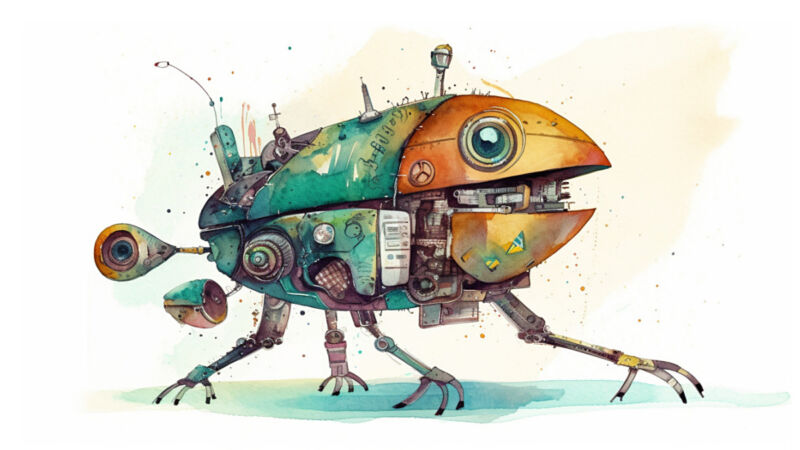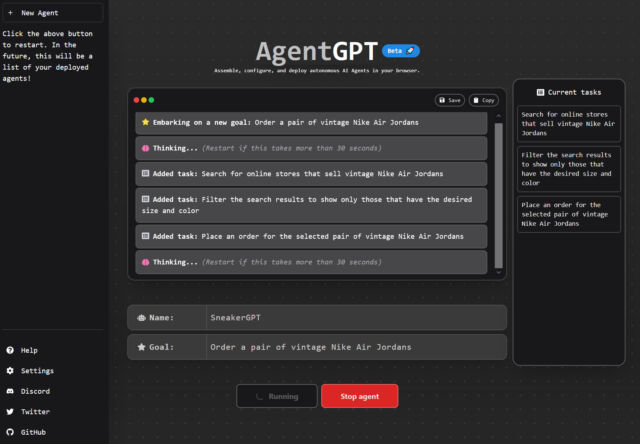[ad_1]

Midjourney
For the reason that launch of OpenAI’s GPT-4 API final month to beta testers, a unfastened group of builders have been experimenting with making agent-like (“agentic”) implementations of the AI mannequin that try to hold out multistep duties with as little human intervention as doable. These homebrew scripts can loop, iterate, and spin off new situations of an AI mannequin as wanted.
Two experimental open supply initiatives, specifically, have captured a lot consideration on social media, particularly amongst those that hype AI initiatives relentlessly: Auto-GPT, created by Toran Bruce Richards, and BabyAGI, created by Yohei Nakajima.
What do they do? Effectively, proper now, not very much. They want a number of human enter and hand-holding alongside the way in which, so they are not but as autonomous as promised. However they signify early steps towards extra complicated chaining AI fashions that might doubtlessly be extra succesful than a single AI mannequin working alone.
“Autonomously obtain no matter objective you set”
Richards payments his script as “an experimental open supply utility showcasing the capabilities of the GPT-4 language mannequin.” The script “chains collectively LLM ‘ideas’ to autonomously obtain no matter objective you set.”
Principally, Auto-GPT takes output from GPT-4 and feeds it again into itself with an improvised exterior reminiscence in order that it will possibly additional iterate on a process, right errors, or recommend enhancements. Ideally, such a script may function an AI assistant that might carry out any digital process by itself.
To check these claims, we ran Auto-GPT (a Python script) domestically on a Home windows machine. While you begin it, it asks for a reputation to your AI agent, an outline of its function, and a listing of 5 objectives it makes an attempt to satisfy. Whereas setting it up, you could present an OpenAI API key and a Google search API key. When operating, Auto-GPT asks for permission to carry out each step it generates by default, though it additionally features a totally computerized mode should you’re feeling adventurous.
If tasked to do one thing like “Buy a classic pair of Air Jordans,” Auto-GPT will develop a multistep plan and try to execute it. For instance, it would seek for shoe sellers, then search for a selected pair that meets your standards. However that is when it stops as a result of it will possibly’t really purchase something—for the time being. If hooked into an applicable buying API, that could possibly be doable.
If you wish to get a style of what Auto-GPT does your self, somebody created a web-based model referred to as AgentGPT that capabilities in an identical means.
Richards has been very open about his objective with Auto-GPT: to develop a type of AGI (synthetic normal intelligence). In AI, “normal intelligence” sometimes refers back to the still-hypothetical capacity of an AI system to carry out a variety of duties and resolve issues that aren’t particularly programmed or educated for.

Ars Technica
Like a fairly clever human, a system with normal intelligence ought to have the ability to adapt to new conditions and be taught from expertise, quite than simply following a set of pre-defined guidelines or patterns. That is in distinction to programs with slender or specialised intelligence (typically referred to as “slender AI”), that are designed to carry out particular duties or function inside a restricted vary of contexts.
In the meantime, BabyAGI (which will get its identify from an aspirational objective of working towards synthetic normal intelligence) works in an identical option to Auto-GPT however with a unique task-oriented taste. You may strive a model of it on the net at a web site not-so-modestly titled “God Mode.”
Nakajima, the creator of BabyAGI, tells us that he was impressed to create his script after witnessing the “HustleGPT” motion in March, which sought to make use of GPT-4 to construct companies robotically as a sort of AI cofounder, so to talk. “It made me curious if I may construct a completely AI founder,” Nakajima says.
Why Auto-GPT and BabyAGI fall in need of AGI is because of the limitations of GPT-4 itself. Whereas spectacular as a transformer and analyzer of textual content, GPT-4 nonetheless feels restricted to a slender vary of interpretive intelligence, regardless of some claims that Microsoft has seen “sparks” of AGI-like behaviors within the mannequin. In reality, the restricted usefulness of instruments like Auto-GPT for the time being could function essentially the most potent proof but of the present limitations of enormous language fashions. Nonetheless, that doesn’t imply these limitations won’t finally be overcome.
Additionally, the problem of confabulations—when LLMs simply make issues up—could show a big limitation to the usefulness of those agent-like assistants. For instance, in a Twitter thread, somebody used Auto-GPT to generate a report about corporations that produce waterproof footwear by looking the net and evaluations of every firm’s merchandise. At any step alongside the way in which, GPT-4 may have doubtlessly “hallucinated” evaluations, merchandise, and even total corporations that factored into its evaluation.
When requested for helpful utility of BabyAGI, Nakajima could not provide you with substantive examples other than “Do Something Machine,” a mission construct by Garrett Scott that aspires to create a self-executing to-do record, which is at the moment in improvement. To be truthful, the BabyAGI mission is simply a few week previous. “It is extra of an introduction to a framework/method, and what’s most fun are what individuals are building on top of this idea,” he says.
